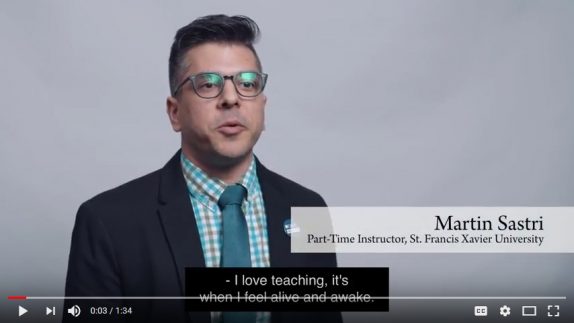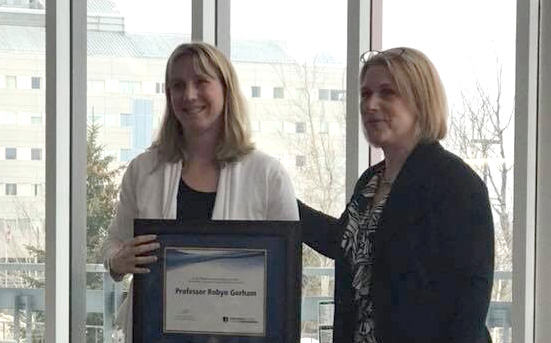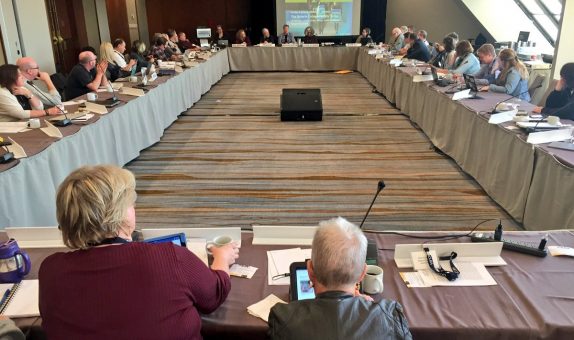
On Saturday, February 3 and Sunday, February 4, OCUFA held its second Board of Directors meeting of the 2017-18 academic year. Over the weekend, board members discussed the organization’s current priorities – good jobs and vibrant universities, university funding, and capacity building – with a focus on the postsecondary issues that will be receiving the most attention in the lead-up to June’s provincial election. During a special lunchtime reception on the Saturday, board members and colleagues celebrated the winner of OCUFA’s Lorimer Award, which recognizes those who have improved the terms and conditions of employment of Ontario university faculty through bargaining.
Priorities
OCUFA’s priorities for the 2017-18 academic year were developed to strategically align with those issues most likely to gain traction with the public and political parties in the lead-up to the provincial election, which is less than four months away. In addition to good jobs and university funding (which are discussed in detail in OCUFA’s 2018 pre-budget submission), capacity building has been identified as an important means through which OCUFA can support the work of local faculty associations. University governance also continues to be a serious concern.
Good jobs and vibrant universities
One of OCUFA’s established long-term goals is a postsecondary education system where every academic job is a good job with fair compensation, reasonable workloads, access to benefits, and job security. Good jobs are essential for fostering vibrant and dynamic universities. This year, OCUFA is focusing on three opportunities for improving the terms and conditions of employment at Ontario’s universities: fairness for contract faculty, faculty renewal, and pensions.
Fairness for contract faculty
In recent years, substantial progress has been made raising awareness about the challenges faced by contract faculty at Ontario universities. At least 10 faculty associations participated in last fall’s Fair Employment Week, and the hope is that even more will participate in OCUFA’s third annual Social Media Day of Action in support of Fairness for Contract Faculty on February 28.
Unfortunately, there are many gaps in the new labour law protections, but momentum continues to build for fairness for contract faculty. With both OCUFA and the Fight for $15 & Fairness campaign pushing for strong protections, this promises to be an important issue in the coming election.
After Bill 148: Promoting fairness for the precariously employed
Following the passage of Bill 148, there has been a great deal of discussion about the improvements the legislation has made to Ontario labour law, as well its gaps in coverage for faculty and academic librarians. In a discussion moderated by Frankie Cachon (Chair of OCUFA’s Contract Faculty and Faculty Complement Committee), panelists Jeff Tennant (Chair of OCUFA’s Collective Bargaining Committee), Kimberly Ellis-Hale (a contract faculty member of the Wilfrid Laurier University Faculty Association), and Daniel Sheppard (a lawyer from Goldblatt Partners) considered the implications of the new law for faculty associations.
There has never been a better time to be advancing fairness for contract faculty, whether through advocacy work or at the bargaining table. As part of the presentation, faculty associations were encouraged to participate in the Fairness for Contract Faculty Social Media Day of Action on February 28 and plan a pre-election event on campus.
Faculty renewal
Over the past decade, the pace of full‐time faculty hiring has fallen dramatically behind growth in student enrolment. This means fewer full-time faculty have been available to carry out the core research and teaching functions of the university. OCUFA continues to advocate for a provincial faculty renewal strategy, and has been engaging in ongoing discussions with staff in the Ministry of Advanced Education and Skills Development to ensure this priority remains top of mind, regardless of who forms government in June.
Pensions
OCUFA has worked with sector stakeholders for several years on an initiative to build a new voluntary jointly sponsored pension plan (JSPP) for Ontario’s universities. The University of Toronto Faculty Association, Queen’s University Faculty Association, and University of Guelph Faculty Association are currently working to finalize a JSPP intended to provide a secure and sustainable pension option for interested university faculty associations and staff unions in the province. As the pension environment shifts, OCUFA will continue to organize workshops and meetings to help all member associations reach their pension-related goals and expand their capacity to communicate pension issues at the local level.
University funding
OCUFA has held a long-standing goal of increasing public funding for universities to support high-quality postsecondary education in Ontario. Over the past several years, the provincial government has been leading a process to update and streamline the university funding formula. Of concern is the government’s intent to tie university funding to performance according to a series of metrics. OCUFA will be focused on securing increased public funding for Ontario’s universities and pushing back against the move towards performance-based funding as part of our election advocacy work. In addition, OCUFA continues to advocate for more meaningful faculty consultation as part of the strategic mandate process through which these metrics and targets are being negotiated.
Capacity building
Ontario’s university faculty face serious challenges in their workplaces, including too few faculty to do the work, and too many precarious jobs at underfunded universities. OCUFA continues to support member associations with capacity building strategies that can be leveraged to build stronger unions and a university labour movement able to more effectively tackle these problems. Member engagement is an ongoing process and this year’s election provides an excellent opportunity for member associations to be active on campus and mobilize their members.
Ad hoc committee on collegial governance
OCUFA members have held longstanding and growing concerns regarding administrative structures at Ontario’s universities and the erosion of collegial governance. In response, OCUFA is forming an ad hoc committee to collect data on existing university administrative structures and practices, articulate a vision of how collegial governance ought to function, and identify a set of best practices that will achieve collaborative, democratic, and transparent administrative structures at our universities.
Update on 2018 provincial election advocacy
During the meeting, members were given a detailed presentation on OCUFA’s advocacy plans in the lead-up to the provincial election on June 7. The presentation included an overview of OCUFA’s advocacy priorities: increased public funding for universities and good jobs for all academic workers, an update on a province-wide poll and press conference tour being organized for March, and OCUFA’s plans to produce analyses of political party positions on issues of importance to university faculty. Board members were encouraged to plan their own on-campus events to lobby local political candidates, highlight faculty priorities, and strengthen relationships with other groups on campus.
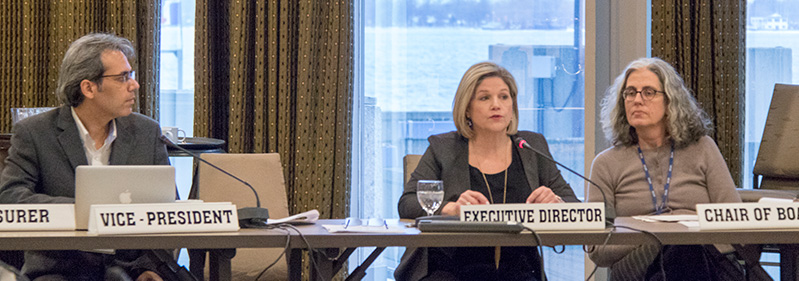
Presentation from Ontario NDP Leader Andrea Horwath
The board meeting featured a presentation from Andrea Horwath, Leader of Ontario’s New Democratic Party. Horwath provided an overview of the NDP’s positions on key postsecondary issues, with a focus on those of importance to university faculty, including increasing university funding, reducing student-faculty ratios, and ensuring contract faculty are better protected through provincial labour law. She also provided an overview of the NDP’s other priority issues, such as introducing pharmacare coverage for all Ontarians and bringing Hydro One back under public ownership. Following her presentation, Horwath answered several questions from Board members about university funding, performance metrics, and how an NDP government would address precarious academic jobs. All three parties were invited to have a representative present at the meeting.
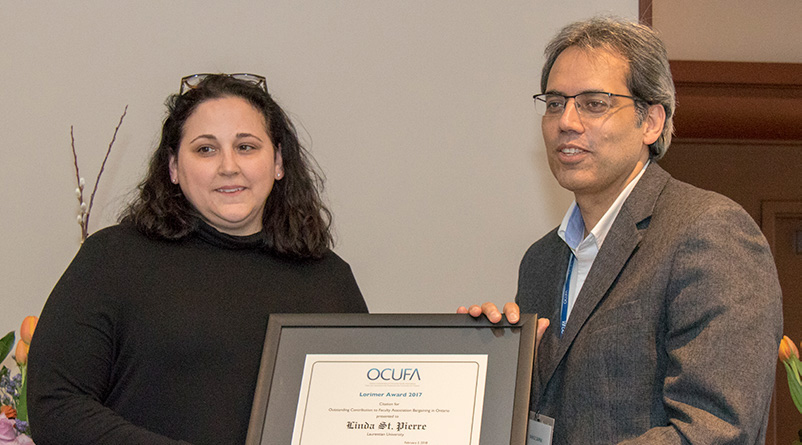
Celebration of 2017 Lorimer Award recipient, Linda St. Pierre
Finally, a special luncheon ceremony celebrated the recipient of OCUFA’s Lorimer Award, Linda St. Pierre. Established in honour of Doug and Joyce Lorimer, who were instrumental in advancing faculty association collective bargaining in Ontario, the Lorimer Award recognizes individuals who have worked to protect and promote the interests of Ontario’s academic staff through collective bargaining. Linda has played a pivotal role in fighting for fairness, equity, and better working conditions for both full-time and contract faculty at Laurentian University.
The next OCUFA Board of Directors meeting will be held May 12-13, 2018.
—
This article originally appeared in OCUFA Report. To receive stories like this every week, please subscribe.





